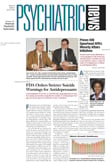In 1998 British gastroenterologist Andrew Wakefield, M.D., and his colleagues published a study in the Lancet that was going to shake up both the medical research community and society at large.
The study included only 12 children with autism, but had two important findings. One was that all 12 had intestinal problems, suggesting a link between autism and bowel disease. The other was that parents of eight of the 12 children reported that their youngsters had shown signs of autism after getting the measles, mumps, and rubella (MMR) vaccine, implying a link between autism and the vaccine.
The latter finding, along with subsequent reports from Wakefield and various colleagues or from press statements issued by Wakefield, prompted a number of parents of autistic children to blame their children’s autism on the MMR vaccine (Psychiatric News, September 7, 2001). It also prompted some legislators to hold hearings on the subject (Psychiatric News, June 7, 2002), and even led to the rates of immunization falling in both the United Kingdom and the United States.
Now the 1998 study is again making waves in the medical research world and in the public arena.
Research Conduct Criticized
Last February 22, some serious allegations of research misconduct were leveled against the study and its authors by the Sunday Times, a major London newspaper.
One of the allegations was that the children who were reported in the Lancet study were also part of a project led by Wakefield and funded by the Legal Aid Board—a pilot project to investigate grounds for pursuing a multiparty legal action on behalf of parents of allegedly vaccine-damaged children—and that this information was not disclosed to the Lancet editors. Another allegation was that before the results were reported in the February 1998 paper, they were passed to lawyers and used to justify a multiparty legal action—an action of which the Lancet editors were also unaware.
Thus, in the March 6 Lancet, considerable space was devoted to the allegations, as well as to statements by Wakefield and two other study authors about those allegations, to a commentary and statements by Lancet editors about the allegations, and to a statement by 10 of the 12 authors of the study.
The statement, which one might view as a partial retraction of the study results, or at least as a retraction of an interpretation of the study results, said: “The main thrust of [the February 1998] paper was the first description of an unexpected intestinal lesion in the children reported. . . . While much uncertainty remains about the nature of these changes, we believe that it is important that such work continue, as autistic children can potentially be helped by recognition and treatment of gastrointestinal problems. We wish to make clear that in this paper no causal link was established between MMR vaccine and autism as the data were insufficient. . . .”
Autism Expert Responds
“I have had a chance to review the commentary and correspondence from the Lancet regarding the partial retraction of findings from the 1998 Wakefield paper,” Fred Volkmar, M.D., a professor of child psychiatry at Yale University and an autism authority, told Psychiatric News.
The paper “has been the source of great concern to parents and clinicians alike,” he said. “The Wakefield, et al., paper was heavily publicized by the media, or at least certain parts of the media; subsequent negative reports that questioned this finding have been much less extensively covered.
“In the context of all the furor that this paper has caused, there is a significant danger that scientific discussion gets lost. In particular, it is the case that a small number of children with autism do have an apparent developmental regression; this is an important topic and deserves further research. As appears to have been the case in this study, however, it is important to realize that temporal associations are not necessarily causal,” Volkmar emphasized.
So where does medical research currently stand on a possible causal link between the MMR vaccine and autism? Some additional studies on the subject have been conducted, Volkmar said, and none of them has come up with positive findings. Yet “the problem with negative studies,” he conceded, “is that it is hard to prove the negative.”
Thus, the controversy on the MMR vaccine and autism is probably not over.
The statements and commentary in the March 6 Lancet are posted online at www.thelancet.com/journal/backissue/vol363/iss9411/contents. Click on the statement or commentary of interest. ▪
